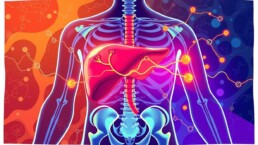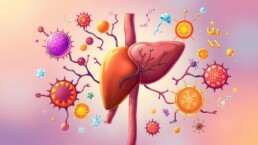Keeping your kidneys healthy is key to feeling good. Creatinine levels show how well your kidneys are working. It’s a waste product from muscle activity that your kidneys filter out.
Table of Contents
ToggleHigh creatinine levels mean your kidneys might not be working right. This could be a sign of kidney disease.
We’ll look at natural ways to lower your creatinine levels and keep your kidneys healthy. Simple diet changes, lifestyle tweaks, and drinking plenty of water can help. These steps can improve your kidney function without needing medicine.
Improving your kidney health is a personal journey. Always talk to your doctor for advice that fits you. Together, we can find natural ways to boost your kidney health and lower creatinine levels.
What is Creatinine and Why Should You Care?
Creatinine is a waste product from muscle breakdown. Your kidneys filter it out and it goes into your urine. If your kidneys aren’t working right, creatinine levels can go up. This means your kidneys might not be working well and could have disease.
Understanding the Role of Creatinine
Creatinine shows how well your kidneys are working. Your kidneys remove waste and extra fluids, and creatinine is part of that. If your kidneys aren’t working right, creatinine levels can rise. This is a sign of kidney trouble.
Consequences of High Creatinine Levels
High creatinine levels can cause serious health problems. You might feel tired, nauseous, or lose your appetite. You could even have neurological issues. Also, high creatinine levels raise your risk of chronic kidney disease. If not treated, this can lead to kidney failure.
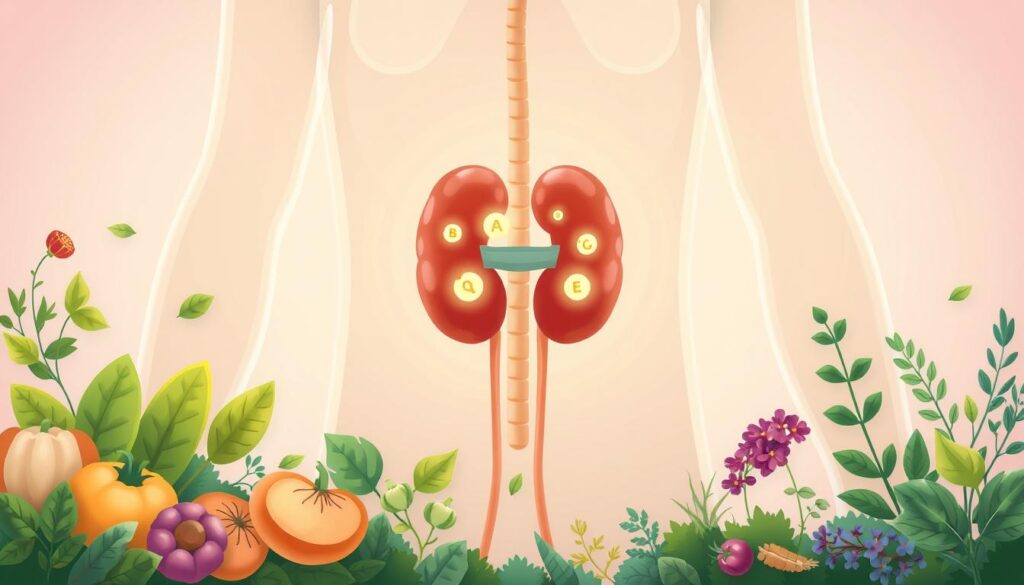
Dietary Modifications to Lower Creatinine
Changing what you eat can really help with creatinine levels. Foods high in protein, like meat and fish, make more creatinine. Eating less protein and more plant-based foods can lower your creatinine.
Foods high in fiber are key for a kidney-friendly diet. They help control creatinine levels. Studies show that more fiber can lower creatinine in people with kidney disease.
To lower your creatinine through diet, try these tips:
- Limit high-protein foods and choose a low-protein diet.
- Add more fiber-rich foods like fruits, veggies, whole grains, and legumes to your meals.
- Consider supplements like chitosan, but talk to your doctor first.
These dietary changes can improve your kidney health and overall wellbeing.
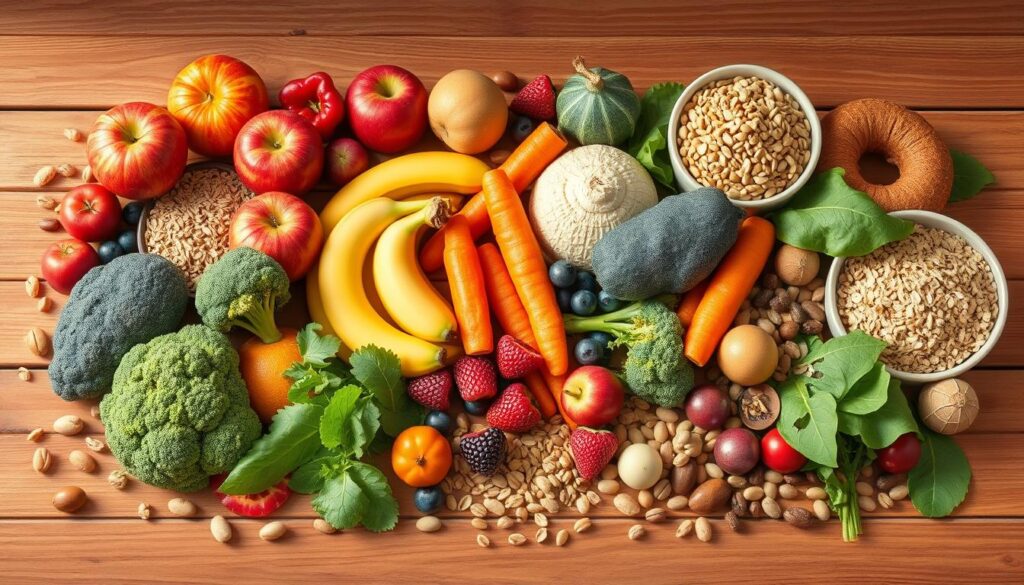
Ways to Reduce Creatinine Levels
If you have high creatinine levels, there are ways to fix it. You need to tackle the main problem. This means looking at the whole picture, not just one part.
Control the Underlying Cause
High creatinine often comes from issues like high blood pressure or diabetes. These can harm your kidneys. To lower creatinine, you must handle these problems first.
Keeping your blood pressure and blood sugar levels in check is key. This helps your kidneys work better. It also lowers creatinine levels.
Kidney Function Restoration Treatment
Kidney Function Restoration Treatment (KFRT) is another way to lower creatinine. It uses natural ways to boost kidney function. This treatment includes herbs and natural supplements.
It helps your kidneys filter out waste better. This reduces creatinine levels in your body.
By fixing the root cause and supporting your kidneys, you can manage your creatinine levels. This improves your overall kidney function.
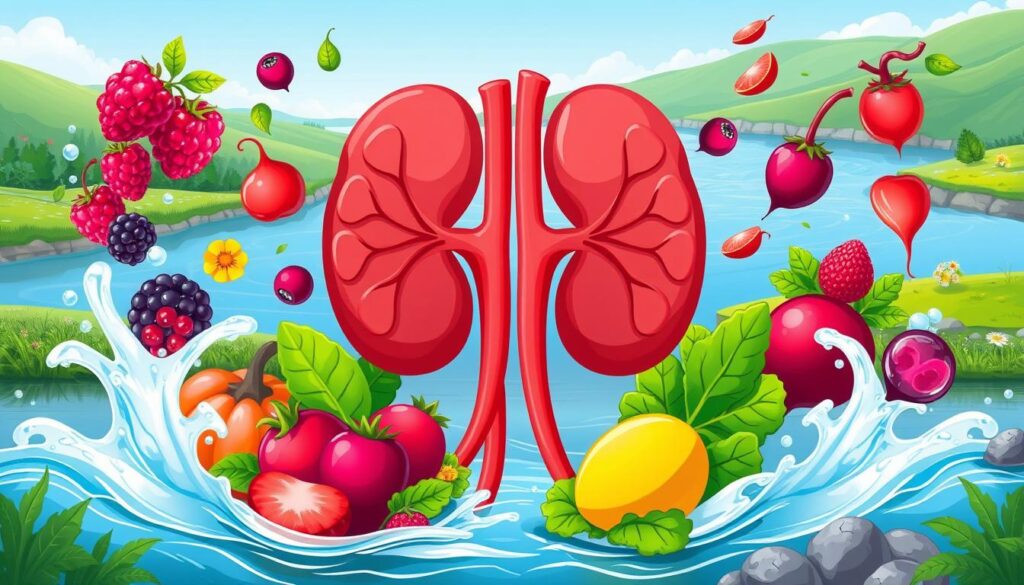
Exercise Precautions for Creatinine Management
Regular exercise is key for health, but managing creatinine levels needs care. High-intensity activities like running or swimming can raise creatinine levels. This is because they increase muscle work. So, it’s wise to choose gentler exercises that don’t stress the kidneys too much.
Avoiding Strenuous Exercises
Exercise is good, but be careful with intensity when creatinine levels are high. Here are some tips:
- Stay away from HIIT workouts, as they can raise creatinine levels by breaking down muscles.
- Long runs or bike rides can also cause a creatinine spike. Avoid these for now.
- Try walking, swimming, or yoga instead. These are gentle and good for health without harming kidneys.
- Talk to your doctor to find the best exercise for your situation and creatinine levels.
Adjusting your workout to include more gentle activities can help manage creatinine levels. This supports your kidney health. The aim is to stay active but avoid exercises that might worsen your condition.

Environmental Factors Affecting Creatinine Levels
Your environment can affect your creatinine levels. Cold weather and harsh climates can play a role. When it’s cold, your body might shiver, raising creatinine levels.
To keep creatinine levels healthy, stay away from cold for too long. Try to keep your environment comfortable and not too hot or cold.
The environmental impact on creatinine goes beyond just temperature. Studies show that many environmental factors can harm your kidneys. This includes heavy metals, pesticides, and pollutants, which can raise creatinine levels and harm your kidneys.
Knowing how climate and kidney health are linked can help you protect your kidneys. Keep your environment clean, drink plenty of water, and check with doctors to watch your kidney health.
The Role of Hydration in Creatinine Regulation
Drinking enough water is key to keeping creatinine levels in check. Not drinking enough can make creatinine levels go up. Drinking water helps spread out creatinine and helps it leave your body through urine.
Staying hydrated, especially when you’re active, helps manage creatinine levels. This is important for your health.
A study with 2,182 people over 20 found that drinking a lot of water helped those with kidney disease. Over 15 years, fewer deaths were seen in those who drank more water.
The European Food Safety Agency says men should drink 2.5 liters and women 2 liters of water a day. But, there’s no special advice for people with kidney disease. Still, studies show drinking more water is good for the kidneys.
Not drinking enough can lead to serious heart problems. Drinking enough water helps your kidneys work better and keeps creatinine levels right.
It’s not just about drinking water. Foods like fruits and veggies also count towards your hydration. Making hydration a habit is a big step towards better kidney health and managing creatinine levels.
Lifestyle Adjustments for Creatinine Control
Keeping creatinine levels healthy is more than just what you eat. Your lifestyle choices also play a big role. One key change is to drink less alcohol.
Limiting Alcohol Consumption
Too much alcohol can harm your digestion and increase waste, including creatinine. It can also raise blood pressure, which is bad for your kidneys. Cutting down or quitting alcohol helps control creatinine and keeps your kidneys healthy.
- Try to drink no more than one drink a day for women and two for men.
- Take breaks from alcohol, like “dry” months, to help your body recover and lower creatinine.
- Choose non-alcoholic drinks like herbal teas or sparkling water to stay hydrated and social without alcohol’s harm.
Changing your lifestyle, like drinking less, is a great way to support your kidneys. Making these changes daily is a big step towards better health.
Monitoring and Consulting with Healthcare Professionals
It’s important to monitor your creatinine levels with blood tests. Working closely with healthcare professionals is key for managing your kidney health. They can explain your test results, find any problems, and create a plan to lower creatinine levels and protect your kidneys.
Regular creatinine testing helps your doctors keep an eye on your kidney function. By working with your healthcare providers, you can make sure your kidneys are checked often and any problems are fixed quickly.
Your healthcare team might suggest certain steps to manage your kidney health:
- Regular blood tests to check creatinine levels and kidney function
- Changing medications or your diet to lower creatinine levels
- Seeing a nephrologist for more specialized care if needed
- Making lifestyle changes, like drinking more water or doing less exercise
Remember, your healthcare providers are your team for staying healthy. By working closely with them, you can take steps to manage your kidney health and deal with any creatinine issues.
Conclusion
To lower your creatinine levels, try changing your diet and lifestyle. Also, use targeted treatments. Stay hydrated and work with your healthcare team. This way, you can summary of natural creatinine reduction methods and improving quality of life.
We talked about natural ways to manage creatinine levels. This includes changing your diet and doing specific exercises. Knowing about creatinine helps you make better choices for your kidney health.
Keeping your creatinine levels balanced is key to your health. Keep working with your healthcare provider. Monitor your progress and follow the strategies from this article. With effort and dedication, you can manage your creatinine levels and live a healthier life.
FAQ
What is creatinine and why is it important?
Creatinine is a waste product from muscle action. It goes from muscles to kidneys via blood and is removed through urine. High levels in blood mean kidneys can’t remove toxins well, which might mean kidney disease.
What are the consequences of high creatinine levels?
High creatinine levels can cause serious health issues. These include fatigue, nausea, loss of appetite, and neurological problems. They also raise the risk of chronic kidney disease and kidney failure if not treated.
How can I lower my creatinine levels through diet?
Eating less high-protein foods like meat, fish, and poultry helps. A diet rich in plants and fiber can also lower creatinine levels.
How can I address the underlying causes of high creatinine levels?
High creatinine levels often come from conditions like high blood pressure or diabetes. Keeping blood pressure and sugar levels healthy can prevent kidney damage. This helps kidneys work better and lowers creatinine levels.
Should I avoid certain types of exercise when trying to lower creatinine?
Yes, be careful with exercise and creatinine. Running, jogging, or swimming can raise creatinine levels. Choose more moderate activities instead.
How can environmental factors affect my creatinine levels?
Cold or harsh climates can increase creatinine production through shivering. Stay in a comfortable, temperate environment to avoid creatinine spikes.
How important is proper hydration for managing creatinine levels?
Drinking enough water is key for healthy creatinine levels. Dehydration can concentrate creatinine in blood, raising levels. Adequate water helps dilute and remove creatinine through urine.
How can lifestyle choices affect my creatinine levels?
Drinking too much alcohol can harm digestion and increase waste, including creatinine. It also raises blood pressure risk for kidney disease. Cutting down or stopping alcohol helps control creatinine and supports kidney health.
How important is it to regularly monitor my creatinine levels?
It’s vital to check creatinine levels regularly with blood tests. Work with healthcare professionals like nephrologists or primary care doctors. They can guide you, interpret results, and create a plan to manage kidney health.
Source Links
- Kidneys disease: How to reduce Creatinine levels naturally?
- Avoid the superfood trap: Tips to improve your creatinine and eGFR
- Creatinine
- 4 natural ways to lower your creatinine levels
- How to lower creatinine levels: Diet tips and home remedies to reduce creatinine at home – Times of India
- Control Your Creatinine Levels with These 5 Best Foods
- Elevated creatinine levels can impact kidney function
- Low Creatinine: Causes, Symptoms, Treatments

This article is medically reviewed by Dr. Chandril Chugh, Board-Certified Neurologist, providing expert insights and reliable health information.
Dr. Chandril Chugh is a U.S.-trained neurologist with over a decade of experience. Known for his compassionate care, he specializes in treating neurological conditions such as migraines, epilepsy, and Parkinson’s disease. Dr. Chugh is highly regarded for his patient-centered approach and dedication to providing personalized care.






